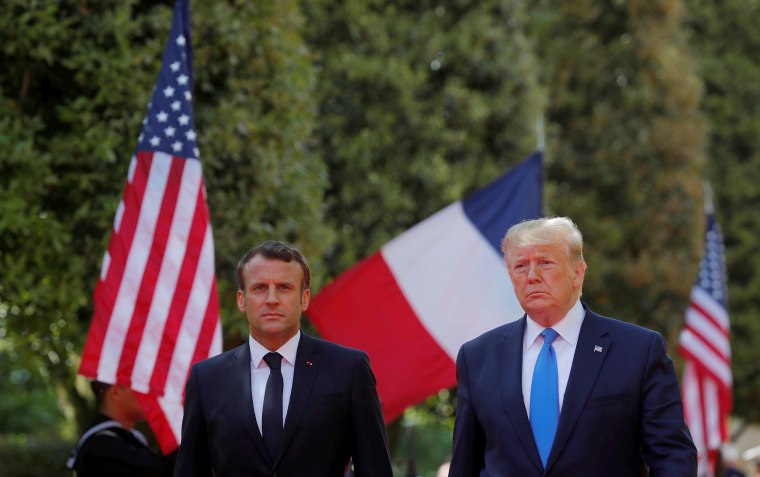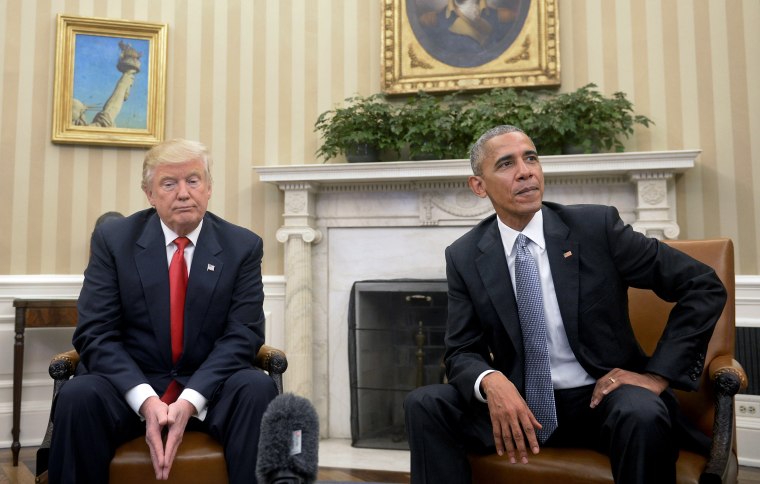WASHINGTON — To supporters of the Iran nuclear deal, it's no surprise that President Donald Trump is now facing a potential war with Iran.
Long before Trump was elected, advocates of the nuclear agreement — including then-President Barack Obama, French President Emmanuel Macron and others — had argued that abandoning the accord carried grave risks that could lead to an armed conflict.
"So let's not mince words. The choice we face is ultimately between diplomacy or some form of war — maybe not tomorrow, maybe not three months from now, but soon," Obama said in a speech in 2015 defending the deal before a congressional vote.
Trump as a candidate vowed to dump what he called "the worst deal ever" and he made good on his promise in 2018. A year later, Trump is openly discussing the pros and cons of bombing Iran.
On Friday, the president said in a tweet that he had ordered and then called off military strikes against Iran after Tehran shot down a U.S. surveillance drone over the Strait of Hormuz.
In his 2015 speech, Obama said that without an agreement limiting Iran's nuclear program in return for sanctions relief, any U.S. administration would be left with only one option to prevent Iran from getting a nuclear weapon — "another war in the Middle East."
Obama said that Iran — unrestrained by the nuclear accord — would soon be on the threshold of developing an atomic bomb. "Without this deal, Iran will be in a position — however tough our rhetoric may be — to steadily advance its capabilities. Its breakout time, which is already fairly small, could shrink to near zero."
"Does anyone really doubt that the same voices now raised against this deal will be demanding that whoever is president bomb those nuclear facilities?" Obama said.
At the time, Republican opponents of the 2015 nuclear agreement, known as the JCPOA, dismissed the idea that the alternative to the deal was waging war on Iran.
Macron and other European leaders repeatedly urged Trump not to abandon the agreement, and voiced concern that the collapse of the accord carried dangers for an already volatile region.
At the U.N. General Assembly in 2017, the French president warned that jettisoning the deal "without anything to replace it would be a grave mistake." And he added that the agreement was "essential to peace, at a time when the risk of an infernal spiral cannot be ruled out."
Macron issued a more dire warning a year later as Trump was poised to abandon the agreement. "That would mean opening Pandora's box, it could mean war," Macron told the German magazine Der Spiegel. But he added, "I don't believe that Donald Trump wants war."
U.N. Secretary General Antonio Guterres said in May 2018 that the nuclear agreement was an "important diplomatic victory" and that discarding it without presenting an alternative would place the Middle East "in a very dangerous position."
German Chancellor Angela Merkel warned Israeli Prime Minister Benjamin Netanyahu that a decision by Trump to withdraw from the nuclear deal might lead to the collapse of the agreement and possibly trigger a regional war, Axios reported last year.

After Trump announced his decision on May 8, 2018, to withdraw the United States from the nuclear accord, Obama repeated his warning about the consequences of doing so.
"Without the JCPOA, the United States could eventually be left with a losing choice between a nuclear-armed Iran or another war in the Middle East." Obama said in a statement.
Trump's opponent in the 2016 presidential race, Hillary Clinton, also cautioned about the dangers of rejecting the agreement between Iran and world powers. "The United States faces a choice to either "move forward on a path to diplomacy or turn down more dangerous path leading to a far less certain and riskier future," she said in a speech in 2015.
In another speech in 2016, Clinton said Trump's approach to the issue was reckless.
"Donald Trump says we shouldn't have done the deal. We should have walked away. But that would have meant no more global sanctions, and Iran resuming their nuclear program and the world blaming us. So then what? War? Telling the world, good luck, you deal with Iran?" Clinton said.
The former head of U.S. Central Command, U.S. Army Gen. Joseph Votel, told senators at a hearing in March 2018 that the nuclear agreement provided a way to counter the threat of Iran developing nuclear weapons, and that it was not clear how that would be addressed if Washington pulled out.
"The JCPOA addresses one of the principle threats that we deal with from Iran, so if the JCPOA goes away, then we will have to have another way to deal with their nuclear weapons program," Votel said.
